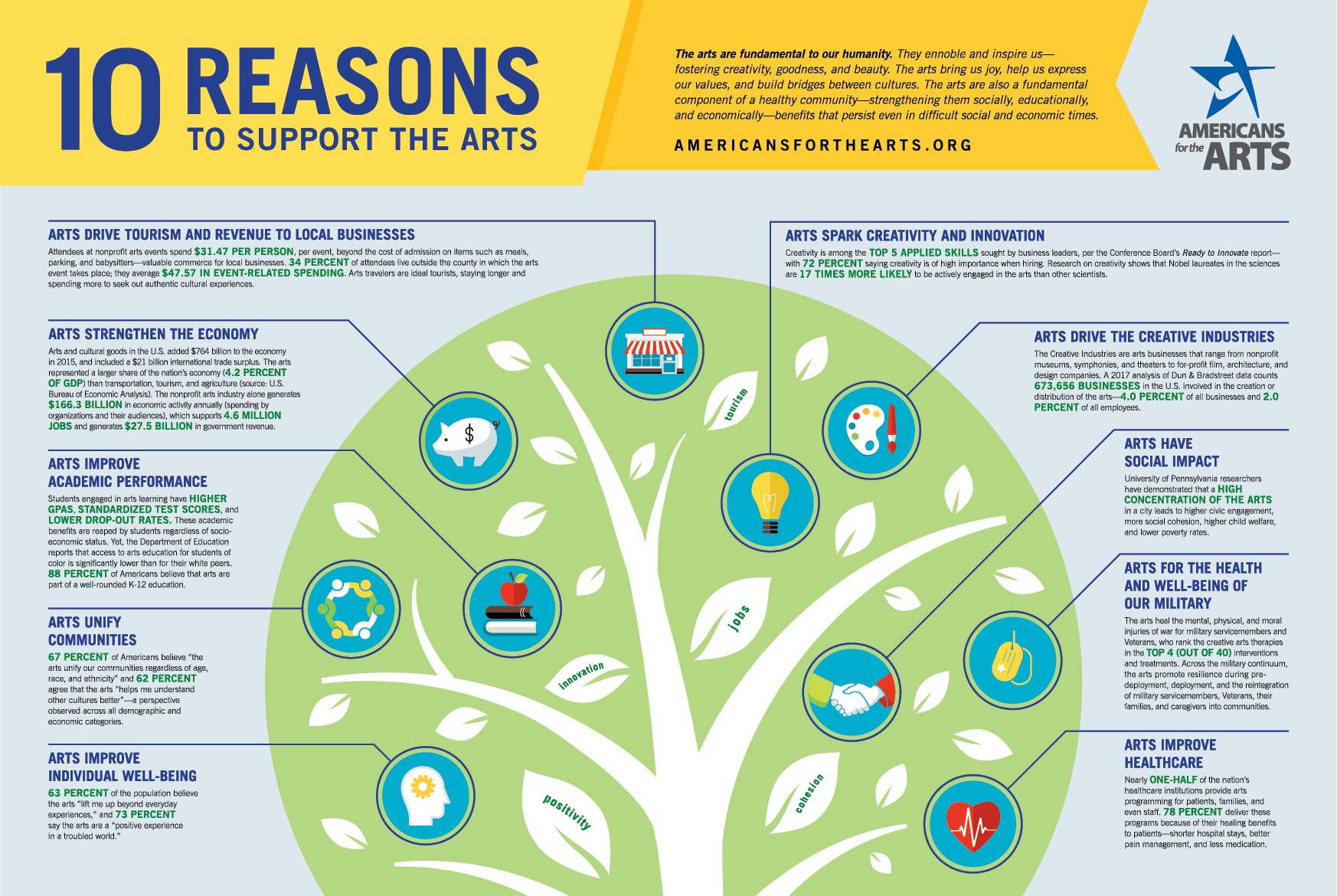Americans for the Arts – Arts Blog by Mr. Randy Cohen, VP for Research & Policy
Mar 23, 2020
10 Reasons to Support the Arts in 2020
The arts are fundamental to our humanity. They ennoble and inspire us—fostering creativity, goodness, and beauty. The arts bring us joy, help us express our values, and build bridges between cultures. The arts also are a fundamental component of a healthy community—strengthening them socially, educationally, and economically—benefits that persist even in difficult social and economic times.
1. Arts unify communities. 72% of Americans believe “the arts unify our communities regardless of age, race, and ethnicity” and 73% agree that the arts “helps me understand other cultures better”—a perspective observed across all demographic and economic categories.
2. Arts improve individual well-being. 81% of the population says the arts are a “positive experience in a troubled world,” 69% of the population believe the arts “lift me up beyond everyday experiences,” and 73% feel the arts give them “pure pleasure to experience and participate in.”
3. Arts improve academic performance. Students engaged in arts learning have higher GPAs, standardized test scores, and college-going rates as well as lower drop-out rates. These academic benefits are reaped by students regardless of socio-economic status. Yet, the Department of Education reports that access to arts education for students of color is significantly lower than for their white peers. 91% of Americans believe that arts are part of a well-rounded K-12 education.
4. Arts strengthen the economy. The production of all arts and cultural goods in the U.S. (e.g., nonprofit, commercial, education) added $877.8 billion to the economy in 2017, including a $29.7 billion international trade surplus—a larger share of the nation’s economy (4.5%) than transportation, tourism, and agriculture (U.S. Bureau of Economic Analysis). The nonprofit arts industry alone generates $166.3 billion in economic activity annually—spending by organizations and their audiences—which supports 4.6 million jobs and generates $27.5 billion in government revenue.
5. Arts drive tourism and revenue to local businesses. Attendees at nonprofit arts events spend $31.47 per person, per event, beyond the cost of admission on items such as meals, parking, and babysitters—valuable commerce for local businesses. 34% of attendees live outside the county in which the arts event takes place; they average $47.57 in event-related spending. Arts travelers are ideal tourists, staying longer and spending more to seek out authentic cultural experiences.
6. Arts spark creativity and innovation. Creativity is among the top five applied skills sought by business leaders, per the Conference Board’s Ready to Innovate report—with 72% saying creativity is of high importance when hiring. Research on creativity shows that Nobel laureates in the sciences are 17 times more likely to be actively engaged in the arts than other scientists.
7. Arts drive the creative industries. The Creative Industries are arts businesses that range from nonprofit museums, symphonies, and theaters to for-profit film, architecture, and design companies. A 2017 analysis of Dun & Bradstreet data counts 673,656 businesses in the U.S. involved in the creation or distribution of the arts—4.01% of all businesses and 2.04% of all employees. (Get a free local Creative Industry report for your community here.)
8. Arts have social impact. University of Pennsylvania researchers have demonstrated that a high concentration of the arts in a city leads to higher civic engagement, more social cohesion, higher child welfare, and lower poverty rates.
9. Arts improve healthcare. Nearly one-half of the nation’s healthcare institutions provide arts programming for patients, families, and even staff. 78% deliver these programs because of their healing benefits to patients—shorter hospital stays, better pain management, and less medication.
10. Arts for the health and well-being of our military. The arts heal the mental, physical, and moral injuries of war for military servicemembers and Veterans, who rank the creative arts therapies in the top four (out of 40) interventions and treatments. Across the military continuum, the arts promote resilience during pre-deployment, deployment, and the reintegration of military servicemembers, Veterans, their families, and caregivers into communities.
